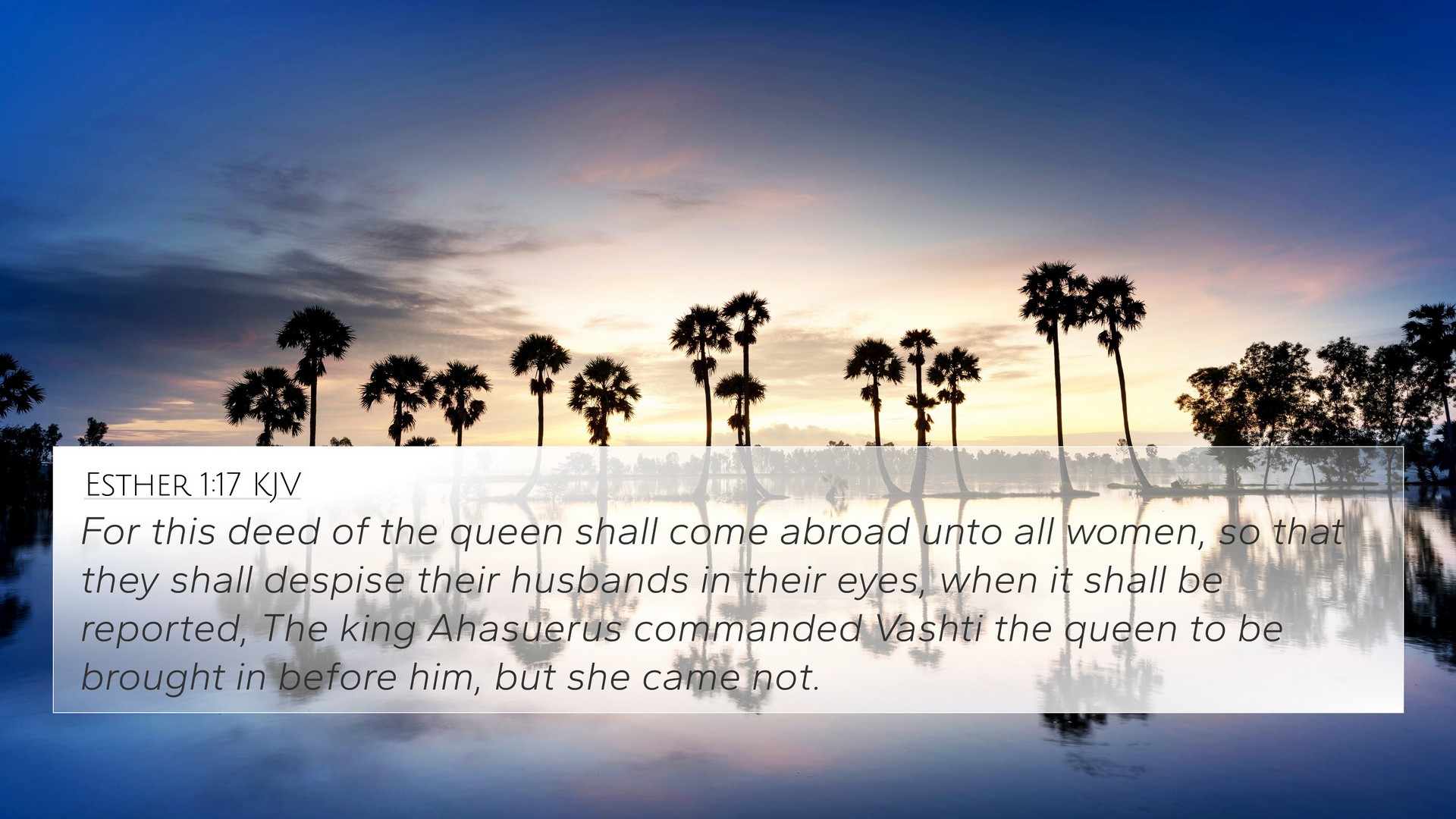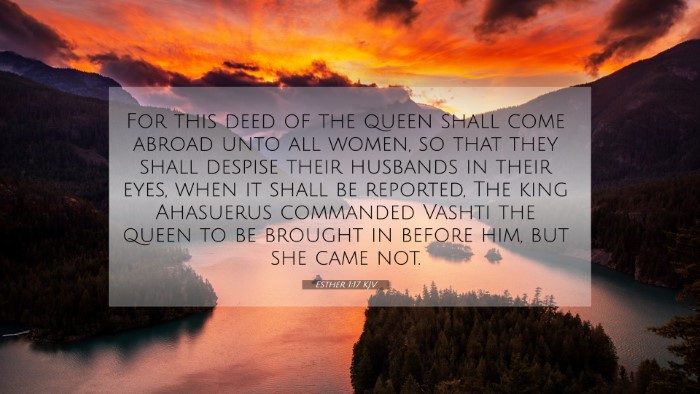Old Testament
Genesis Exodus Leviticus Numbers Deuteronomy Joshua Judges Ruth 1 Samuel 2 Samuel 1 Kings 2 Kings 1 Chronicles 2 Chronicles Ezra Nehemiah Esther Job Psalms Proverbs Ecclesiastes Song of Solomon Isaiah Jeremiah Lamentations Ezekiel Daniel Hosea Joel Amos Obadiah Jonah Micah Nahum Habakkuk Zephaniah Haggai Zechariah MalachiEsther 1:17 Similar Verses
Esther 1:17 Cross References
For this deed of the queen shall come abroad unto all women, so that they shall despise their husbands in their eyes, when it shall be reported, The king Ahasuerus commanded Vashti the queen to be brought in before him, but she came not.
Uncover the Rich Themes and Topics of This Bible Verse
Listed below are the Bible themes associated with Esther 1:17. We invite you to explore each theme to gain deeper insights into the Scriptures.
Esther 1:17 Cross Reference Verses
This section features a detailed cross-reference designed to enrich your understanding of the Scriptures. Below, you will find carefully selected verses that echo the themes and teachings related to Esther 1:17 KJV. Click on any image to explore detailed analyses of related Bible verses and uncover deeper theological insights.

2 Samuel 6:16 (KJV) »
And as the ark of the LORD came into the city of David, Michal Saul's daughter looked through a window, and saw king David leaping and dancing before the LORD; and she despised him in her heart.

Ephesians 5:33 (KJV) »
Nevertheless let every one of you in particular so love his wife even as himself; and the wife see that she reverence her husband.
Esther 1:17 Verse Analysis and Similar Verses
Insights on Esther 1:17
Esther 1:17 reads: "For the queen's behavior will become known to all women, so that they will despise their husbands in their hearts. There will be an abundance of contempt and wrath." This verse is situated within the narrative of Queen Vashti's refusal to appear before King Ahasuerus, which leads to significant consequences.
Interpretation Summary
The message of Esther 1:17 warns against the influence of individual actions on social dynamics, particularly in the context of marriage and authority. The King’s advisors express concern that Vashti’s defiance will inspire other women to behave similarly, undermining male authority in their households.
- Matthew Henry's Commentary: Henry asserts that the King's advisors overreact, showcasing a patriarchal perspective that fears the impact of one woman's disobedience. He notes the broader implications for societal values and relationships.
- Albert Barnes' Notes: Barnes highlights the fear of scandal and how Vashti’s actions could be misinterpreted as a rebellion against marital expectations. He interprets this as a pivotal moment that sets the stage for Esther’s rise to power.
- Adam Clarke's Commentary: Clarke contemplates the consequences of public disobedience, remarking on how Vashti’s refusal could potentially foster a culture of dissatisfaction among women, influencing their perceptions of authority within the familial structure.
Cross-References for Esther 1:17
This verse connects to several other biblical texts, underscoring the initial tension between authority and obedience:
- Proverbs 31:10-31: The qualities of a virtuous woman and the respect she commands.
- 1 Peter 3:1-2: The instruction for wives to win over unbelieving husbands through conduct.
- Ephesians 5:22-24: The biblical mandate for wives to submit to their husbands.
- Genesis 3:16: The dynamic of the relationship post-fall, emphasizing the desire of women for their husbands.
- 1 Corinthians 11:3: The order of authority in the family structure as God establishes.
- Titus 2:4-5: Instructions for older women to teach younger women about good conduct in the home.
- Malachi 2:16: God's disfavor toward divorce and injustice in marital relationships.
Thematic Bible Verse Connections
Esther 1:17 reveals themes of authority, gender roles, and public versus private behavior, highlighting how social repercussions can amplify personal actions. This situation can be further explored through thematic connections:
- Social Order and Authority: How personal choices impact collective norms.
- Gender Dynamics: The struggle within familial authority and societal expectations of women.
- Public Image: The significance of reputation in biblical times and its repercussions on personal behavior.
- Obedience and Rebellion: Examining the tension between compliance and personal conviction.
Scriptural Cross-Referencing Techniques
To delve deeper into cross-referencing biblical texts related to Esther 1:17, individuals can utilize various methods:
- Bible Concordance: A tool to find related verses by keywords.
- Bible Cross-Reference Guide: Comparing similar themes or subjects across different scriptures.
- Bible Study Resources: Utilizing commentaries, study Bibles, and thematic guides to understand contextual connections.
- Inter-Biblical Dialogue: Exploring how various biblical books converse with each other.
Why Cross-References are Important
Understanding the connections between Bible verses is essential for grasping the overarching themes and lessons of scripture. Cross-referencing provides a fuller context and emphasizes the cohesion of biblical narratives.
Finding Related Bible Verses
When searching for verses that relate to Esther 1:17, consider:
- Similarities between Queen Vashti and other biblical figures: Evaluating how female agency plays out in other stories.
- What verses support the themes of power and submission: Focusing on verses that elaborate on authority dynamics in relationships.
Conclusion
The verse Esther 1:17 serves as a critical commentary on the nature of authority, gender roles, and social norms during biblical times. By examining this and its related verses, one can better understand the complexities of divine teachings on human interactions and values.


